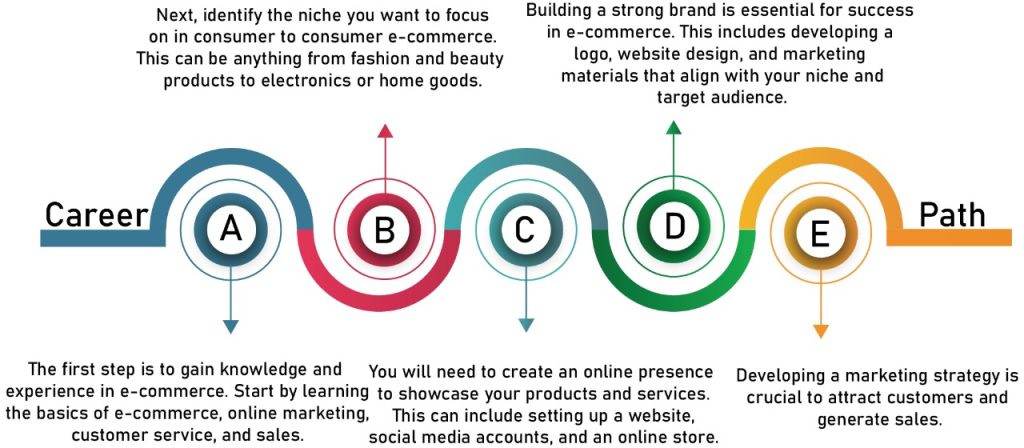Consumer-to-consumer (C2C) e-commerce involves online transactions between individuals. As more people turn to online shopping, the demand for C2C platforms such as eBay, Etsy is increasing. This creates opportunities for individuals to turn their passion for selling items online into a career. Starting a C2C e-commerce business can offer flexible working hours and the freedom to work from anywhere. However, it requires careful planning, marketing strategies, and dedication to building a brand and customer base. It is also essential to comply with relevant laws and regulations.

Work description
The work involved in C2C e-commerce can vary depending on the specific role or business.
For entrepreneurs, the work may involve sourcing products, setting up an online store, and managing sales and customer service.
For those in sales and marketing, the work may involve creating product listings and promotions to attract customers.
For those in operations and logistics, the work may involve managing inventory, processing orders, and shipping products.
Stable career path
Low startup costs: Starting a C2C e-commerce business typically requires little to no startup costs, making it accessible to a wide range of individuals.
Competitive salary
Opportunities for growth: As the e-commerce industry continues to grow, there are always new opportunities for growth and expansion.
Opportunities for growth
Cost-effective: Selling online saves costs associated with traditional brick-and-mortar retail stores.
Transferable skills
Convenient: Buyers can shop from the comfort of their homes and sellers can manage their business from anywhere.
high demand
Potential for higher profit margins: Sellers can sell directly to customers without intermediaries, which can lead to higher profit margins.
Job satisfaction
The need for financial accounting is not limited to any specific industry, so there is always a high demand for qualified professionals.
High stress
Competitive market: The C2C e-commerce market is highly competitive, which can make it difficult to stand out and attract customers.
Long hours
Reliance on technology: C2C e-commerce relies heavily on technology, and technical issues can be a major setback for businesses in this field.
Details oriented
Limited customer trust: Consumers may be wary of buying from unknown sellers and vice versa.
Starting a C2C e-commerce business in India typically requires minimal investment, as there are many low-cost platforms available for individuals to sell products.
[wpcharts type=”horizontalbarchart” bgcolor=”red:gray:yellow,blue:gray:yellow,random:gray:yellow,purple:gray:yellow” min=”0″ legend=”true” titles=”2 year , 5 year” values=”3,7,5,12″]
The earning potential can be significant, with many successful C2C e-commerce businesses generating substantial revenue.
[wpcharts type=”horizontalbarchart” bgcolor=”red:gray:yellow,blue:gray:yellow,random:gray:yellow,purple:gray:yellow” min=”0″ legend=”false” titles=”Entry-Level, Mid-Career, Senior-Level ” values=”5,15,25,35,45,55″]
Unlimited earning potential
Opportunities for growth
Accessible to a wide audience
Cost-effective for sellers
Convenient for buyers
Competitive market
Reliance on technology
Limited control over the shipping and delivery process
Risk of scams and fraud
Legal considerations and regulations
Tendency to procrastinate or miss deadlines.
Work-life balance
The work-life balance in C2C e-commerce can vary depending on the specific role or business. For entrepreneurs, there may be a need to work longer hours initially to set up and grow the business, but once established, there can be more flexibility in scheduling. For those in sales and marketing, the work may involve more regular hours, but with the potential for some schedule flexibility. For those in operations and logistics, the work may involve more fixed hours and less flexibility.

The impact of a career in C2C e-commerce can vary depending on the specific business and its practices.
In general, C2C e-commerce has the potential to democratize commerce, allowing individuals to buy and sell products without the need for traditional retail intermediaries.
This can create new opportunities for entrepreneurs and consumers, but it can also create challenges around issues like safety, fraud, and intellectual property.
Computer engineering has enabled advancements in fields such as healthcare, education, and communication, leading to better access to services and resources.
The increasing reliance on technology has led to concerns about privacy and security, leading to the need for stronger regulations and cybersecurity measures.
The development of automation and artificial intelligence may lead to job displacement and require reskilling for certain sectors.
Online Marketplace Manager
responsible for managing the overall operations of an online marketplace, including managing seller accounts, resolving customer complaints, and developing policies and procedures.
E-commerce Marketing Manager
responsible for developing and executing marketing campaigns to attract and retain customers, such as email campaigns and social media marketing.
Data Analyst
responsible for analyzing data related to e-commerce transactions, customer behavior, and sales patterns to identify trends and opportunities for improvement.
Web Developer
responsible for designing and developing the website and user interface for an e-commerce platform.
Fraud Analyst
responsible for monitoring and preventing fraudulent transactions on an e-commerce platform, including reviewing suspicious transactions and identifying potential risks.
Conclusion:
In Conclusion, pursuing a Career in Computer Engineering in India requires a Strong Foundation in math and science, a passion for technology, and a willingness to continuously learn and adapt to New Developments in the industry. With competitive salaries, opportunities for career growth, and the potential to make a significant impact on society, computer engineering can be a Rewarding and Fulfilling Career choice for those who are up for the challenge.



